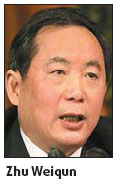National
Policy on Tibet is consistent
(China Daily)
Updated: 2009-10-29 11:47
 |
Large Medium Small |
Editor's note: Zhu Weiqun, the executive vice director of the United Front Work Department (UFWD) of the Communist Party of China (CPC), was interviewed by Germany's Focus magazine on September 22 about China's policy on the Tibet Autonomous Region and the central government's attitude towards the Dalai Lama. Following is an excerpt of the interview, published in the magazine on Oct 5.
Q: Tibet is an ethnic autonomous region of China. What is your perception of the concept of "autonomy"?

A: Due to their different historical and cultural traditions and different ethnic structure, all countries may apply different policies for ethnic autonomy. Each country is entitled to handle domestic ethnic relations according to its unique national conditions. No country has the right to force its own policy onto others.
Q: What rights do the Tibetan people enjoy? Can you give an example of how they exercise their own right to govern their own affairs?
A: Local Tibetans elect the people's congress and governments at all levels in Tibet autonomous region. In line with the principle of the Constitution, they have the right to make decisions on the development of local economy and social affairs. Our ethnic autonomy is related with the unity of the country and union of all ethnic groups. Ethnic autonomy does not exist without them.
Q: The Dalai Lama and some Tibetans complain that they were excluded from the process of Tibetan modernization and deprived of the right to participate in local cultural and religious affairs. Also, it is true that Tibetans have taken on a lot of local government posts, but most of them do not hold important positions. Is that true and what are your comments?
A: The allegation that ethnic Tibetan officials only occupy nominal positions without the real decision-making power in hand is totally contrary to fact. Without our Tibetan officials in the crucial positions, how could Tibet achieve such earthshaking progress in such a short period? Our statistics indicate that nearly 70 percent of the top leaders of local Party committees region-wide are ethnic Tibetans.
The Dalai Lama's so-called "autonomy blueprint" for Tibet has exposed his ambition to restore Tibet's widely denounced former feudal hierarchic system to the vast Himalayan region.
Q: Why does the Chinese authority so deeply distrust the Dalai Lama and treat him with suspicion? What is the evidence of the Chinese authority to accuse the Dalai Lama clique as the mastermind of last year's March 14 Lhasa riots?
A: The Dalai Lama fled after a failed rebellion in 1959 against the democratic reform campaign launched by the central government. During the 1960s, with the help of some Western countries, the Dalai Lama had long been engaging in armed sabotage and disturbance at the frontier area. After all these plots and conspiracy were frustrated, the Dalai Lama began to turn to the so-called "middle line" instead of pursuing complete independence for Tibet. However, the so-called "middle line" is still in nature "Tibet independence". We have ample facts and evidence that last year's Lhasa violence was premeditated, masterminded and incited by the Dalai Lama clique. The existence of the so-called "Tibet exiled government", which is essentially an overseas separatist group, is in itself a source of turbulence. Since 2007 to the opening of the Beijing Olympic Games, the Dalai Lama clique, especially the extremist group "Tibetan Youth Congress", had organized and incited a series of violent activities in an attempt to disrupt Tibet's society. Also, the Dalai Lama himself has made several speeches since the March 14 riots to defend involved criminals.
Q: At the end of last year, the Chinese authorities ended talks with the Dalai Lama's private representative. So under what conditions could the central government restart the talks?
A: It is not the Chinese central government but the Dalai Lama himself that halted the talks. During the talks in last Nov, the Dalai Lama's representative showed a so-called "memorandum on Tibetans' genuine autonomy" and claimed that the following talks with the central government should be based on the memorandum. At that time, the central government's stance is crystal clear that the memorandum is another edition of the "Tibet independence" plot that is completely unacceptable. Seeing its attempt fail to come true, the Dalai Lama clique immediately convened a special meeting among "all exiled Tibetans" and announced the suspension of the contact and talks.
It is the central government's consistent stance that we are always open to talks. However, that could only be under the precondition that the Dalai Lama abandons his separatist remarks and activities.
Q: When we visited Tibet and talked to some young people, they all appreciated the considerable progress in local living standard. In spiritual life, however, the publicity and religion teaching are confined only to the temples. There is no religious class in schools. And do the Tibetan people have the rights to express their views and criticize the government?
A: Though Tibet has achieved rapid and great progress in economic development, there is still a gap between the region and the country's eastern areas. Hence, we cannot say Tibet has modernized too fast, rather it needs to develop even faster.
In regards to religion, like other places in the country, Tibetans enjoy sufficient religious freedom. The rights of religious belief and practice are fully respected and protected without any hurdles. But, of course, as a secular state with separation between church and school, like most countries in the world, it is not allowed to preach and propagate religion in public schools.
In the whole country including Tibet, citizens are entitled the freedom to criticize the government. Criticism, which can be widely seen in the media, especially on the Internet, is protected. However, it is not tolerable if someone wants to break the law, sabotage the national unity, and topple the State.













